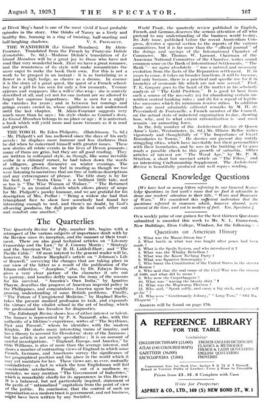The Quarterlies
TIIE Quarterly Review for July, number 501, begins with a retrospect of the various subjects of importance dealt with by the Review since its inception, and the manner of their treat- ment. There are also good technical articles on " Literary Censorship and the Law," by J. Conway Morris ; " Strategy and the American War," by B. H. Liddell-Hart ; and " The Pacific Cable." Of more interest to the general reader will be, however, Sir Andrew Macphail's article on " Johnson's Life of Boswell," surveying the changes that are taking place in our view of the latter as a result of the publication of the Isham collection. " Josephus," also, by Dr. Fklwyn Bevan, gives a very clear picture of the character it sets out to portray, and touches deftly upon the irony of the reasons for his survival. " America's Own India," by Ignatius Phayre, describes the progress of American imperial policy in the Philippines, and congratulates America upon her rapidly growing understanding of some British problems. Finally, "I'he Future of Unregistered Medicine," by Raphael Roche, takes the present medical profession to task, and expounds the virtues of the vitalist school in the art of healing, which the professional has forsaken for diagnostics.
The Edinburgh Review shows less of either interest or talent. The former is represented by P. S. Nazaroff, who, with the authority of a lifetime's experience, writes of " The Scythians, Past and Present," whom he identifies with the modern Kirghiz. He starts many interesting trains of inquiry, and has a theory to account for Herodotus' story of the Amazons ; but his article is not merely speculative ; it is an account of careful investigations. " England, Europe, and America," by Orlo Williams, is also of more than the average interest, and shows a number of contrasting views of England in which some French, Germans, and Americans survey the significance of her geographical position and the place in the world which it may yet maintain for her. These views are, as ever, mutually contradictory—a fact in which the true Englishman will feel considerable satisfaction. Finally, out of a mediocre re- mainder, we may mention " The Government of Industries," which is remarkable chiefly for its appearance in this Review. It is a balanced, but not particularly inspired, statement of the perils of " rationalized " capitalism from the point of view of the public. Its conclusion, that the control of such an organization as a modern trust is government, and not business, might have been written by any Socialist. World Trade, the quarterly review published in Englishi French, and German, deserves the serious attention of all who pretend to any understanding of the business world to-day. Its July issue, published before the recent Amsterdam Con- gress, devotes a special section to the reports of the various committees, but it is far more than the " official journal " of the doings and sayings of the International Chamber of Commerce. Mr. Thomas W. Lamont, Chairman of the American National Committee of the Chamber, writes sound common sense on the Bank of International Settlements. " The Bank "—we agree absolutely—" was a natural and necessary evolution from the facts of the Reparation settlement. If. in years to come, it takes on broader functions, it will he because, and only because, there is a practical and specific use for it in branches of economic life which are not now served." Prof. T. E. Gregory goes to the heart of the matter in his scholarly analysis of " The Gold Problem." It is good to hear front such a source of the necessity (a) for abandoning certain Un- written central banking rules ; and (h) for a repeal of legisla- tive measures which fix minimum reserve ratios. In addition there are most admirable editorial remarks by M. IL de Peyerimhoff de Fontenelle, a French member of the Council, on the actual state of industrial organization to-day, showing how, why, and to what extent rationalization is—and must remain—an animating force.
In the July number of the Architectural Review (9 Queen Anne's Gate, Westminster, 2s. (id.) Mr. Hilaire Belloe writes vigorously and thoughtfully of " The Importance of Exact Boundaries to Towns." He decries our present day untidy straggling cities, which have inevitably lost their personalities with their boundaries, and he sees in the building of by-pass roads a possible cheek to this growth of suburbia. Other articles of interest are " The Wood Age," by Mr. P. M. Stratton, a short but succinct article on " The Films," and an interesting Craftsmanship Supplement. The Archilectura: Review is beautifully produced and well repays reading.


































 Previous page
Previous page